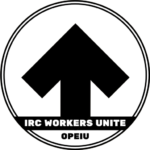Frequently Asked Questions
Why are all these IRC offices organizing?
IRC workers across the country are realizing the need to have direct service workers’ voices at the forefront of policy decisions that impact our work. Right now, all decisions are made by headquarters management who are often far removed from our work.
What’s a union and how can it help?
A union is a group of workers who come together to make changes they can’t make on their own. Our union gives us a legally binding process for shaping the wages, benefits, and working conditions that impact our work on a day-to-day basis. We work with management to shape our union contract.
How will this impact our clients?
We are organizing to ensure our clients’ needs are represented in every level of decision making. We also believe that by decreasing turnover, and increasing our stability, we can better serve our clients on a daily basis and in the long term
What if I’m in a right to work state?
You can still organize! In fact, our colleagues in Dallas were the first to organize their union and enter into bargaining. They are in a right-to-work state, but continue to build power every day. For some history on the history of right-to-work states, read here: https://www.labornotes.org/2018/07/racist-history-right-work
Will this put IRC out of business?
We are our union, and we have no interest in losing our jobs. Our goal is to make IRC more transparent through our negotiations with headquarters management, and to work collaboratively on ensuring the IRC is a sustainable workplace for all.
Will I get fired for this? What protections do I have?
It is illegal for management to retaliate against workers for union activity. We are protected, regardless of our immigration status/visa status, by the National Labor Relations Act. You can read more about your rights here: https://www.nlrb.gov/about-nlrb/rights-we-protect/your-rights
What if I’m here on a work visa? I don’t want to risk my ability to work in the US!
Workers with mixed immigration status or on a work visa are allowed to be a part of organizing and have specific federal protections. Your immigration status should NOT preclude your involvement. Learn more about your rights here: https://www.nlrb.gov/guidance/key-reference-materials/immigrant-worker-rights
How much are union dues?
Union dues will vary based upon the OPEIU local you join, but most commonly are 1.5x your hourly rate. However, nobody pays dues before you negotiate a contract that all members will then ratify through a vote. It’s only then that you become a dues paying member.
Does supporting the union mean we’ll have to go on strike?
Strikes are a powerful tool that workers decide to use after many other important steps. Most union contracts are ratified without striking. However, WE will be the ultimate decision makers on whether or not we would go on strike
Management says a union can’t guarantee anything - is this true?
While nothing is guaranteed, having a seat at the table to help bargain a contract is non-negotiable. We are building upon what we already have and ensuring the protection of the benefits that we enjoy. Right now, most of us are at-will employees whose happiness and livelihood depend on whoever our managers are – we think that should not be the norm and are confident that a union changes that.
How can I help?
Contact us at [email protected] or fill out our contact form if you’re interested in getting involved with our national movement! It takes all of us to build a strong and representative union.
